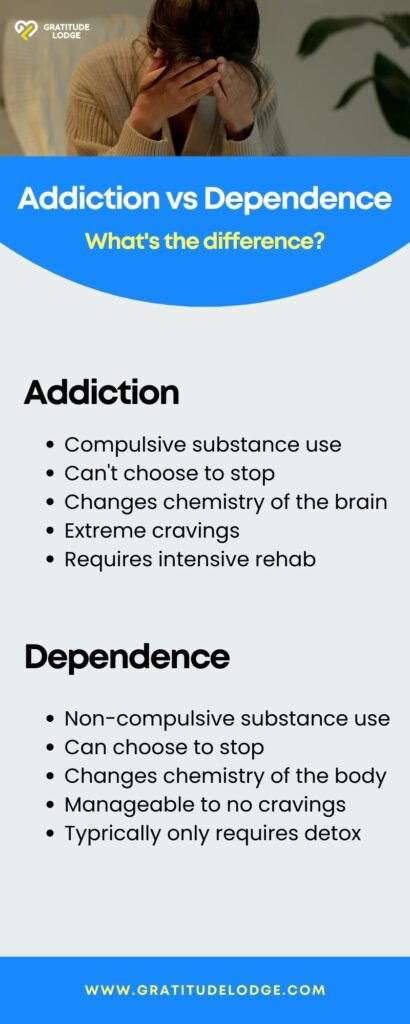Maybe you’ve just discovered that someone you care about abuses drugs or alcohol. It can be hard to understand why they couldn’t just give it up—especially if it is causing harm to their close relationships and to their own life. Why can’t they stop cold turkey? Today, we’re going to find out why, which begins with a look at the difference between addiction vs. dependence.
ADDICTION VS DEPENDENCE
“Addiction” and “dependence” are often interchanged terms that can be difficult to keep straight, even for the medical community. In 1964, the World Health Organization wanted to replace “addiction” with “dependence.”
After that, The Diagnostic and Statistical Manual of Mental Health Disorders (DSM) used to consider addiction and dependence as separate disorders. Now, they use a more exact term to nail down the difference: substance use disorder. Substance use disorder is considered a mental disease that affects behavior and the inability for a user to control their use of alcohol or drugs—whether it’s prescription or not.
However, there are still important differences when it comes to understanding addiction vs. dependence.
WHAT IS ADDICTION?
Addiction is a complex brain disorder that involves compulsive drug seeking and use regardless of negative consequences. Addiction, clinically termed SUD (substance use disorder) is defined by NIDA (National Institute on Drug Abuse) as a chronic and relapsing condition that affects the brain and behavior, and can trigger a range of physical, psychological, and social complications. Addiction is not just a weakness or a moral failing, but rather a complex interplay of biological, psychological, and environmental factors.
When addiction to a substance develops, the brain’s reward system is disrupted, prompting powerful craving for drugs or alcohol. Cravings are often accompanied by an array of physical and psychological symptoms, including irritability, anxiety, depression, and insomnia. Over time, the brain becomes tolerant to the effects of drugs, requiring higher doses to achieve the same effect. This can lead to a cycle of drug use that can be difficult to break without professional help.
Addiction can stem from genetic, psychological, environmental, and social factors. Some people may be at heightened risk of addiction due to their genes or brain chemistry, while others may develop addiction as a result of trauma, stress, or self-medicating mental health disorders like anxiety or depression. Addiction can also be fueled by social and cultural factors like peer pressure, advertising, or easy access to drugs.
Addiction is a treatable condition, but it requires professional help and support. Drug abuse disorders are diagnosed according to the criteria in DSM-5-TR (the fifth revised edition of Diagnostic and Statistical Manual of Mental Disorders). DSM-5-TR is the standard reference used by healthcare professionals to diagnose and classify mental health disorders, including substance use disorder. SUD is a condition characterized by a problematic pattern of drug abuse leading to significant impairment or distress, as outlined in the DSM-5 criteria. The DSM-5 criteria for addiction are as follows:
- Taking the substance in larger amounts or for longer than intended.
- Wanting to moderate or discontinue using the substance but not managing to do so.
- Spending lots of time getting, using, or recovering from using the substance.
- Cravings and urges to use the substance.
- Problems managing responsibilities at work, home, or school because of substance use.
- Continuing to use the substance, even when it causes problems in relationships or social situations.
- Giving up important social, occupational, or recreational activities because of substance use.
- Using the substance again and again, despite physical or psychological problems caused or made worse by it.
- Tolerance, which is the need for increasing amounts of the substance to achieve the desired effect.
- Withdrawal, which is the onset of physical and psychological effects when substance use is reduced or stopped.
- Using larger amounts of the substance over time, which can lead to physical dependence and addiction.
Addiction is diagnosed according to the number of criteria that present as mild (2 to 3), moderate (4 to 5), or severe (6 or more).
Addiction treatment typically involves a combination of detoxification, therapy, medication, and support groups. The goal of addiction treatment is not just to stop drug use, but also to help individuals build the skills and strategies they need to maintain sobriety and achieve a fulfilling life in recovery.
One of the key challenges of addiction treatment is that it is a chronic and relapsing condition. Even after successful treatment, the risk of relapse remains high, particularly in the early stages of recovery. That said, with the right support and resources, individuals with addiction can learn to manage their condition and lead fulfilling and productive lives.
WHAT IS DEPENDENCE?
Physical drug dependence refers to a condition in which the body becomes physically reliant on a drug to function normally. Dependence is a natural physiological response that occurs when someone uses a drug over a prolonged period of time, triggering changes in the brain and body. Physical dependence is not the same as addiction, but it is often a component of addiction.
Drug dependency is a condition where their body has adapted to the presence of the drug and may experience withdrawal symptoms if the drug is reduced or discontinued abruptly. Withdrawal symptoms can vary depending on the drug and the individual’s physical and mental health status, but they can be uncomfortable and even life-threatening in some cases.
Opioids, for instance, are known for their ability to provoke the rapid development of physical dependence. If you use opioids regularly over a prolonged period of time, your body will adapt to the presence of the drug and may experience withdrawal symptoms if the drug is reduced or stopped suddenly. Withdrawal symptoms for opioids can include flu-like symptoms like nausea, vomiting, diarrhea, muscle aches, and sweating. In severe cases, opioid withdrawal can cause seizures and other life-threatening effects.
Benzodiazepines, another type of drug commonly associated with physical dependence, can also provoke the presentation of withdrawal symptoms. Benzos are often prescribed to treat anxiety and insomnia, but if you use this class of medication regularly over a sustained period of time, your body may become dependent on them. Withdrawal symptoms for benzodiazepines can include anxiety, irritability, insomnia, tremors, and seizures.
Physical dependence can occur even if the drug is used as prescribed by a healthcare professional. This is why it is vital to follow the recommended dosage and duration of use when taking prescription drugs.
DEPENDENCE AND PRESCRIPTION DRUG USE
Dependence commonly occurs with prescription drugs, even when the drugs are taken as instructed. Patients may not even know that they are dependent on their drugs until they visit their doctor again and tell them that the medication isn’t working. This is common with prescription painkillers and anti-anxiety medication, such as Vicodin and Xanax respectively, which can also be addictive.
DIFFERENCE BETWEEN ADDICTION AND DEPENDENCE
Like with caffeine, you may notice that you have a headache if you don’t have your daily dose of coffee. Maybe you notice you’ve increased your intake from one cup of coffee to two cups. That is considered dependence. The body demands an increased dose for the same effect, and it has a physical withdrawal effect if it doesn’t receive the dose.
However, in this case of dependence, you can choose not to drink coffee for the rest of the week, and choose to deal with the headache with the assistance of aspirin. The headache will eventually go away on its own as your body normalizes itself without caffeine.
If you were addicted to caffeine, you wouldn’t be able to make the decision to stop your daily regimen of drinking coffee. You would feel compelled to get caffeine no matter what, even if it meant begging outside of a coffee shop to get it.
In general, addiction indicates more of a substance use disorder vs a dependence that relates more to your body becoming accustomed to a particular behavior or substance.

ADDICTION TREATMENT
The U.S. government considers addiction to be a disease of the brain. The good news is that if you or your loved one is struggling with the terrible effects of addiction, they can receive help. Because it’s recognized as a disease in the brain, help is often covered by insurance. Insurance plans will clarify if they cover treatments on your policy that can help: detox, inpatient rehab, and medications at a treatment center near you.
DETOX
Detox treatments provide a medically supervised space for addicts to get rid of the drugs in their body naturally with time. Mental health side effects and physical withdrawal symptoms will appear, some of which can be as intense as seizures or suicidal thoughts. But under professional care, these effects can be managed and medicated safely.
INPATIENT REHAB
After detox, you or your loved one can attend inpatient rehab at our Newport Beach addiction treatment centers. This is where you’ll receive ongoing care for your withdrawal symptoms, and you’ll attend therapy for mental health symptoms. You’ll also have access to a support circle of other detoxed addicts aiming for the same goal of lifelong recovery. We also offer inpatient rehab at our Long Beach treatment center.
MEDICATIONS FOR ADDICTION RECOVERY
Some prescribed medications can help dull withdrawal symptoms. Other medications can even make the drug that you or your loved one are addicted to less appealing, or blocked by certain receptors in the brain. Coming up with a recovery plan isn’t as simple as taking pills—medical staff can help determine which medication you need based on your duration of drug or alcohol abuse and your possible co-occurring mental health disorders.
SUBSTANCE ABUSE AND ADDICTION TREATMENT IN ORANGE COUNTY
Dependence vs addiction can be a tricky distinction to make. In short, addiction means that the brain has chemically changed as a reaction to drug abuse. Addiction is widely considered a disease, and there are plenty of treatment plans available that insurance policies cover.
Dependence means that the body is reliant upon the drug and can build a tolerance to the drug. Drug dependence is also treatable, and it’s commonly treated by reducing dosage slowly over time. As a patient, you may also receive medication to help with the physical side effects of lowering your dosage. Whether you or your loved one is struggling with addiction or dependence, there are treatment and recovery options for the umbrella term: substance use disorder.
At Gratitude Lodge in Orange County, our addiction treatment program helps individuals recover from a life of addiction and dependence. Learn more about our treatment centers and call us at 800-994-2184 to get back on track and start your recovery today.
Related Topics: Outpatient treatment, behavioral health treatment modalities, the holistic rehab approach.v
Addiction vs Dependence FAQs
Substance abuse refers to the harmful or excessive use of drugs or alcohol, which may lead to negative consequences in various areas of a person’s life. On the other hand, substance dependence, also known as addiction, involves a more severe and compulsive pattern of substance use, characterized by physical and psychological dependence, tolerance, and withdrawal symptoms when the substance is not used.
No, dependence is not a milder form of addiction. While both dependence and addiction involve reliance on a substance, addiction is considered more severe as it encompasses both physical and psychological dependence, along with compulsive drug-seeking behavior and an inability to control substance use despite negative consequences. Dependence, on the other hand, primarily refers to the body’s adaptation to the presence of a drug, leading to withdrawal symptoms when the substance is discontinued.
Substance abuse refers to the harmful or excessive use of drugs or alcohol, leading to negative consequences in various areas of a person’s life. Substance dependence, on the other hand, involves a more severe and compulsive pattern of substance use, characterized by physical and psychological reliance on the substance, tolerance, and withdrawal symptoms when the substance is not used.




























